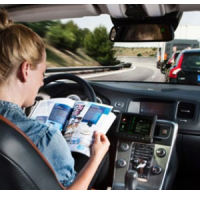Driverless Test Cars Have Perfect —Unverifiable—No-Fault Crash Road Record

Forty-eight cars with driverless capacity have been cruising around California since last September, when the state legalized testing them on public roads, and have been involved in four minor accidents.
But according to Associated Press, which broke the story, two of the accidents occurred while the driver controlled the car (it can switch back and forth) and all four were the fault of the other driver. AP got the story first, but details are TK because the California Department of Vehicles (DMV) can’t give them out and the companies are selective in their talking points.
DMV said there were four accidents, but nothing else. No information on locations or details on the accidents. Google Inc, which has a fleet of 23 Lexus SUVs, acknowledged that three of the accidents involved its cars, and Delphi Automotive had the fourth. Both companies said the accidents were not their fault, but not much else.
AP guessed that the Google fleet had traveled about 140,000 miles since the Fall, based on a company comment that the cars had been driven the equivalent of 15 years for a single vehicle. Three accidents is a much higher rate than the national average of 0.3 reported “property-damage-only crashes” per 100,000 miles.
But Chris Urmson, director of Google’s self-driving car program, also says the company cars have had 11 minor accidents over 1.7 million miles since the company began testing on the roads six years ago, without official approval. That pencils out to a much healthier 0.6 accidents per 100,000.
Urmson wrote in an article for Medium on Monday, the day of the AP story, that the cars have never been at fault in an accident when in self-drive mode, and he didn’t mention the driver being at-fault in any of the other accidents. A perfect record is considerably better than the 94% of accidents (pdf) attributed to human error by the National Highway Traffic Safety Administration (NHTSA).
The DMV is working on driverless-car rules—due last January 1—for gaining various certifications, including one for safety, before sales commence. They could involve plain vanilla choices of allowing manufacturers to self-certify (Google’s favorite), require independent third-party certification, have the state do it all or create a hybrid.
It is a public process that may be a tad short on transparency as at least seven companies work on products that, realistically, won’t be in showrooms for years. Google has predicted 2017 and other companies 2020, but it could be a lot longer.
The cars being tested are capable of being operated by a driver, but the industry prefers a driverless design. Some envision its initial use as a taxi-like service shuttling along familiar paths—picture Uber, without the superfluous labor force. But that kind of road familiarity would not be required of the envisioned car of the near-future.
The car reacts to a wide range of factors as it scans 360 degrees across hundreds of feet, calculating its actions based on the present situation and its database of “experience.” That’s a database that is being constantly updated as information from testing, including crashes, is processed by the companies.
While the industry sorts that out, Consumer Watchdog would like the public to be along for the ride. In an open letter (pdf) to Google, the advocacy group asked the company to release the accident and “autonomous vehicle” reports it must submit by law to DMV:
“You want to eliminate the most basic safeguard, a licensed driver to take control. . . . This aim makes it even more important for the public to understand any accidents that occur involving your vehicles during the testing phase.”
–Ken Broder
To Learn More:
Google Acknowledges 11 Accidents with Its Self-Driving Cars (by Justin Pritchard, Associated Press)
4 Driverless Cars Get into Accidents in California (by Justin Pritchard, Associated Press)
Are Google’s 11 Driverless Car Accidents Scary—or Really Impressive? (by Jason Dorrier, Singularity Hub)
What We Know and What We Don’t Know About Accidents Involving Self-Driving Cars (by Megan Geuss, Ars Technica)
Google Self-Driving Cars Crash on Roads Across California (by John Dewey, Tech News Today)
Driverless Cars: A Tremendous Innovation with a Glaring Achilles’ Heel (by Matt McFarland, Washington Post)
What Google Didn't Say About Its Self-Driving Cars (by Jon Healey, Los Angeles Times opinion)
California Will Blow Self-Imposed Deadline for Driverless Cars (by Ken Broder, AllGov California)
- Top Stories
- Controversies
- Where is the Money Going?
- California and the Nation
- Appointments and Resignations
- Unusual News
- Latest News
- California Forbids U.S. Immigration Agents from Pretending to be Police
- California Lawmakers Urged to Strip “Self-Dealing” Tax Board of Its Duties
- Big Oil’s Grip on California
- Santa Cruz Police See Homeland Security Betrayal in Use of Gang Roundup as Cover for Immigration Raid
- Oil Companies Face Deadline to Stop Polluting California Groundwater





